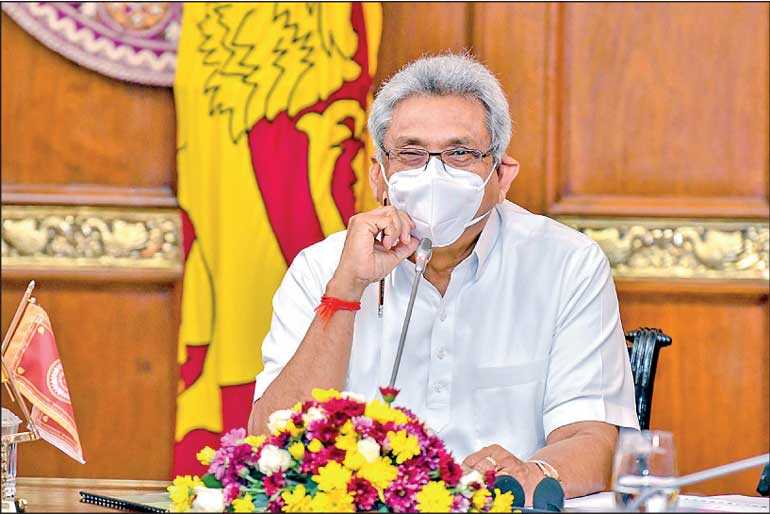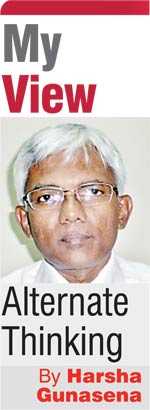Sunday Apr 13, 2025
Sunday Apr 13, 2025
Saturday, 21 November 2020 00:10 - - {{hitsCtrl.values.hits}}

Based on the decisions President Gotabaya Rajapaksa has taken so far it is felt that he places his belief on constitutional power. Therefore, it is necessary to have an alternative to the constitution making process since it is more likely that the process would be based on his wishes rather than the interests of the country
The Government has appointed a nine-member Expert Committee to prepare the preliminary draft for a new constitution. 
The last regime has done a lot in preparation of a new constitution. Their approach was a democratic one and therefore it took a long time to complete. The two leaders of the previous regime did not have a political will to bring it to an end.
Initially there was a report of the Public Representations Committee headed by Lal Wijenayake. Thereafter, the Constitutional Assembly appointed members representing all parties in the Parliament to six sub committees covering the areas of Fundamental Rights, Judiciary, Law and Order, Public Finance, Public Service and Centre-Periphery Relations to assist the Steering Committee.
All the reports of the sub committees were published. Based on the Steering Committee deliberations and reports of the sub committees, an expert panel prepared a report to the Steering Committee in the form of a draft constitution and the Steering Committee decided to present the same to the Constitutional Assembly without preparing its own draft. In the appendix of the proposed draft there were alternative proposals by the political parties as well as the certain members of the expert panel.
Neither the Government nor the Expert Committee said that this literature would be perused. Therefore, this process would be an extension of the backward Sri Lankan political culture that there is a new start up once a new government is appointed.
Moreover, in the Government benches in the Parliament there are number of members who actively participated in those six committees. Some of them headed some of those committees. There were Chief Ministers of the Sri Lanka Freedom Party who demanded more powers to the Chief Ministers to have a meaningful devolution of power to the Provincial Councils. Some of them are now in the Government benches. Also, there are members in the Government benches who voted in favour of 17A and 19A which restricted centralised power. All of them en masse voted in favour of 20A which broadened centralised power. The reason was that it was the wish of the President.
Also, the 1972 Constitution which was passed by the then Government with its two-third majority in the Parliament failed to give Tamil the status of an official language although with the prominent contribution of Dr. Colvin R. De Silva.
The Constitution in 1978 which was passed with its five-sixths majority in Parliament by the then Government granted enormous power to the president compared to other two branches of the democracy although with the contribution of Mark Fernando who became a renowned justice later. All these happened with the wish of the then leader of the Government.
The arbitrary wish of the leader of the Government was not reflected in 17A and 19A which were spearheaded by the parties without majority power of the Parliament. Quite in contrast the then President was eager to get his powers reduced under 19A
Therefore, the new constitution will be shaped based on the wishes of the President rather than the needs of the country. The basic problem in Sri Lanka is that the power is concentrated in the top in the expense of the bottom and in the centre in the expense of the periphery. If the power can be shifted from top to bottom the problem the south is having with the Constitution would be solved and if the power can be shifted from the centre to the periphery the problem the north and east is having with the Constitution would be solved. The obstacle for this was the demand of a strong leadership arose at the last two elections. It is an obstacle since the problem was grasped at the wrong end.
A strong democracy
In order to have a strong democracy there should be a strong leader. A strong leader should have a strong vision and a strong convincing power to convince the people and his/her followers. If the leader wants concentrated constitutional power for that, he or she would not be a strong democratic leader. Dictators want such powers. They want only to order and there should be a bunch of people to implement those orders. The strength of a strong leader should come from within and not from outside.
A strong democracy would not need a leader with arbitrary constitutional power. The need is to have leader with strong and broad vision with the ability to convey it to the people.
Nelson Mandela was such a person. Once he became the President, he continued to engage the white people not only in building the economy but also in his personal security with the opposition of African National Congress and the people at large. He was able to convince all of them that he was correct. That was strong leadership.
President Donald Trump is refusing to concede the election defeat. USA is supposed to be a matured democracy unlike Sri Lanka. None of the Sri Lankan leaders behaved in that manner. With the reports published at that time the only exception was President Rajapaksa in January 2015. Even in that instance matters were sorted out by the dawn of the following day. President Trump’s behaviour is sheer weakness.
President J.R. Jayewardene was unable to contain the July 1983 riots with all the presidential powers, undisputed leadership of the governing party, five-sixths legislative power to that party and with undated resignation letters of those MPs. Hence, he was a weak leader. This is contrary to the popular belief of his leadership. He wanted power to safeguard himself and not the people.
Prime Minister Sirima Bandaranaike was stronger compared to President Jayewardene. Although she did not have such constitutional powers as him, she took appropriate decisions at appropriate times. All of these leaders have their own pluses and minuses.
President Gotabaya Rajapaksa
There is an opinion that President Gotabaya Rajapaksa is a strong leader. The President has more time to prove that. If he is a strong leader all of us should be happy since he is our President. In his own words he is the President not only of the people who voted for him but also of the people who did not vote him including the people of other ethnic and religious groups although he came to power mainly with Sinhala Buddhist votes.
Based on the decisions he has taken so far it is felt that he places his belief on constitutional power. Therefore, it is necessary to have an alternative to the constitution making process since it is more likely that the process would be based on his wishes rather than the interests of the country.
In parallel to the official process there could be a shadow process of making a constitution independent of the leaders of the country and the bunch of yes men at the Parliament. I believe that this draft should include the provisions of recalling the elected representatives in certain instances as in Switzerland and the state of California in USA. In addition to that, the points the politicians are reluctant to include in the constitution which are related to their existence can also be included. Thereafter, the draft constitution can be presented to the political leaders. This will last for few years.
There are discussions in society to this effect. One of those was organised by Rights Now – Collective for Democracy using technology. Resource persons were Jayampathy Wickramaratne, Lal Wijenayake and K.W. Janaranjana and the discussion was conducted by Jagath Liyanarachchi. The discussion was started with the issue of how human rights and devolution of power be included in the constitution and by the end of the discussion it was decided to send the proposals to the Expert Committee, publish the same and engage in preparation of a shadow constitution.
If it is materialised it would be the first active public intervention in preparation of a constitution to which all of us can agree.